新视野大学英语读写部分教材(电子版)NHCE Book One-Unit 1-Section A
- 格式:doc
- 大小:23.00 KB
- 文档页数:2
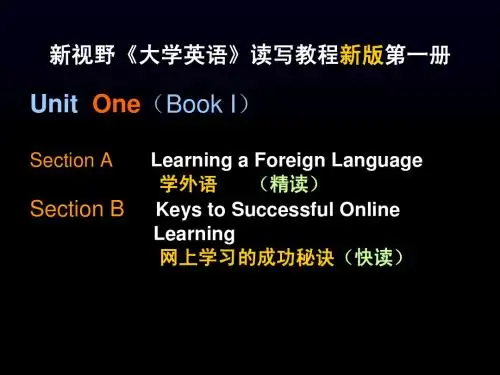
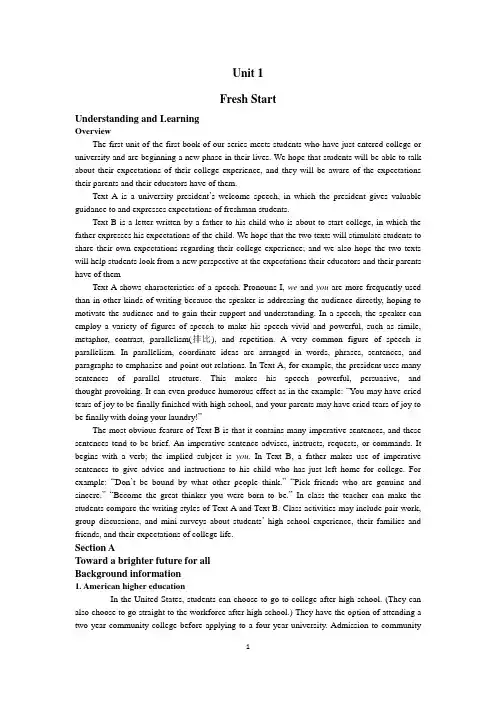
Unit 1Fresh StartUnderstanding and LearningOverviewThe first unit of the first book of our series meets students who have just entered college or university and are beginning a new phase in their lives. We hope that students will be able to talk about their expectations of their college experience, and they will be aware of the expectations their parents and their educators have of them.Text A is a university president’s welcome speech, in which the president gives valuable guidance to and expresses expectations of freshman students.Text B is a letter written by a father to his child who is about to start college, in which the father expresses his expectations of the child. We hope that the two texts will stimulate students to share their own expectations regarding their college experience; and we also hope the two texts will help students look from a new perspective at the expectations their educators and their parents have of themText A shows characteristics of a speech. Pronouns I, we and you are more frequently used than in other kinds of writing because the speaker is addressing the audience directly, hoping to motivate the audience and to gain their support and understanding. In a speech, the speaker can employ a variety of figures of speech to make his speech vivid and powerful, such as simile, metaphor, contrast, parallelism(排比), and repetition. A very common figure of speech is parallelism. In parallelism, coordinate ideas are arranged in words, phrases, sentences, and paragraphs to emphasize and point out relations. In Text A, for example, the president uses many sentences of parallel structure. This makes his speech powerful, persuasive, and thought-provoking. It can even produce humorous effect as in the example: ―You may have cried tears of joy to be finally finished with high school, and your parents may have cried tears of joy to be finally with doing your laundry!‖The most obvious feature of Text B is that it contains many imperative sentences, and these sentences tend to be brief. An imperative sentence advises, instructs, requests, or commands. It begins with a verb; the implied subject is you.In Text B, a father makes use of imperative sentences to give advice and instructions to his child who has just left home for college. For example: ―Don’t be bound by what other people think.‖―Pick friends who are genuine and sincere.‖―Become the great thinker you were born to be.‖In class the teacher can make the students compare the writing styles of Text A and Text B. Class activities may include pair work, group discussions, and mini-surveys about students’high school experience, their families and friends, and their expectations of college life.Section AToward a brighter future for allBackground information1. American higher educationIn the United States, students can choose to go to college after high school. (They can also choose to go straight to the workforce after high school.) They have the option of attending a two-year community college before applying to a four-year university. Admission to communitycollege is easier, tuition is lower, and class sizes are often smaller than at a university. Community college students can earn an associate agree and transfer up to two years of course credits to a university.College and university students need to pay tuition, but many earn scholarships or receive loans. Although admissions policies vary from one university to another, most determine admission based on several criteria, including a student’s high school course of study, high school Grade Point Average (GPA), participation in extracurricular activities, SAT(Scholastic Assessment Test) or ACT (American College Testing) exam scores, a written essay, and possibly a personal interview with a representative from the admissions office.Most students in the United States take the SAT Reasoning Test or the ACT during their final year of high school. Each university sets a minimum SAT or ACT score that a student must achieve in order to gain admission. These are standardized quantitative examinations. The SAT tests critical reading, mathematics, and writing skills, The ACT tests English, mathematics, reading, science reasoning, and includes an optional writing test.Extracurricular activities may include scholastic clubs, athletic teams, student government, and philanthropic clubs. V oluntary participation in these kinds of activities is an indication that a student has learned valuable life lessons, such as teamwork, leadership, or civic responsibility.University students pursuing a bachelor’s degree are called ―undergraduates‖; students pursuing a master’s or doctoral degree are called ―graduate students‖. Most universities give under graduate students a liberal education, which means students are required to take courses across several disciplines before they specialize in a major field of study. Graduate and professional programs, such as medicine or law, are specialized. All degree programs require students to complete a minimum number of credit hours before graduating.Selection for admission to a graduate program is based on several criteria. These include completion of a bachelor’s degree, the student’s undergraduate coursework and GPA. Students are also expected to write an essay as part of their application or to submit a writing sample. Most master’s programs require students to have a minimum score on the Graduate Record Examination (GRE), which tests verbal reasoning, quantitative reasoning, critical thinking, and analytical writing skills.Students continue to take course at the graduate level. A final thesis is required for most master’s programs. Doctoral students take course until they have earned enough credit hours to attempt their qualifying examinations. These are usually taken over several days and often include a written and oral component. After doctoral students pass their qualifying exams, they are advanced to candidacy and can begin writing their dissertation. Before the degree is given, the completed dissertation must be orally defended before the candidate’s faculty committee.2. Vera WangVera Wang is a Chinese-American fashion designer. She was born and raised in New York City. While trained as a figure skater in high school, she eventually earned a degree in art history from Sarah Lawrence College in 1971. But a career in fashion was her dream. She worked as a senior fashion editor for Vogue magazine for 15 years. In 1985, she left vogue and joined Ralph Lauren as a design director for two years. In 1990, she opened her own design salon in New York, and featured her trademark bridal gowns. Wang has made wedding gowns for many celebrities and public figures, such as Jennifer Lopez (詹尼佛·洛佩兹), Sharon Stone (莎朗·斯通) and Chelsea Clinton (切尔西·克林顿).Detailed study of the text1. Your achievement is the triumph of years of hard work, both of your own and of your parents and teachers. (Para. 1)Meaning: Your entering this university is an important success. This success is due to many years of your hard work, and many years of your parents’ and teachers’ hard work.★triumph: n. [C] an important victory or success after a difficult struggle (尤指苦战后获得的)胜利,成功,成就Winning the championship was a great personal triumph for this young tennis player.赢得冠军对这个年轻的网球运动员来说是很大的个人成就。
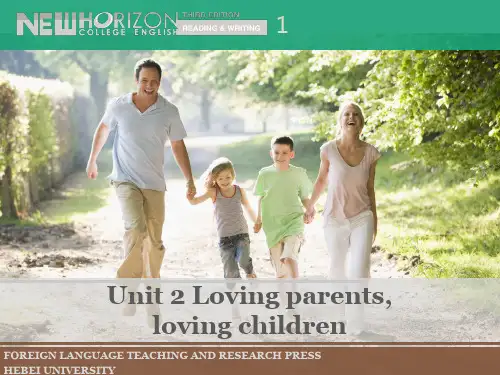
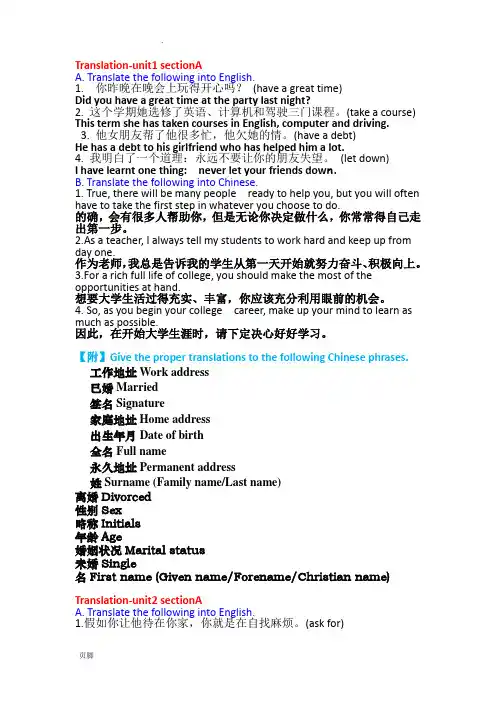
Translation-unit1 sectionAA. Translate the following into English.1. 你昨晚在晚会上玩得开心吗?(have a great time)Did you have a great time at the party last night?2. 这个学期她选修了英语、计算机和驾驶三门课程。
(take a course) This term she has taken courses in English, computer and driving.3. 他女朋友帮了他很多忙,他欠她的情。
(have a debt)He has a debt to his girlfriend who has helped him a lot.4. 我明白了一个道理:永远不要让你的朋友失望。
(let down)I have learnt one thing: never let your friends dow n.B. Translate the following into Chinese.1. True, there will be many people ready to help you, but you will often have to take the first step in whatever you choose to do.的确,会有很多人帮助你,但是无论你决定做什么,你常常得自己走出第一步。
2.As a teacher, I always tell my students to work hard and keep up from day one.作为老师,我总是告诉我的学生从第一天开始就努力奋斗、积极向上。
3.For a rich full life of college, you should make the most of the opportunities at hand.想要大学生活过得充实、丰富,你应该充分利用眼前的机会。
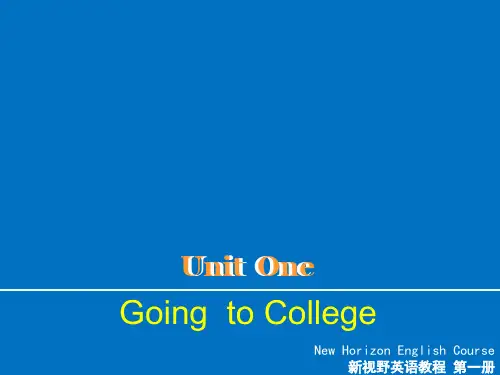
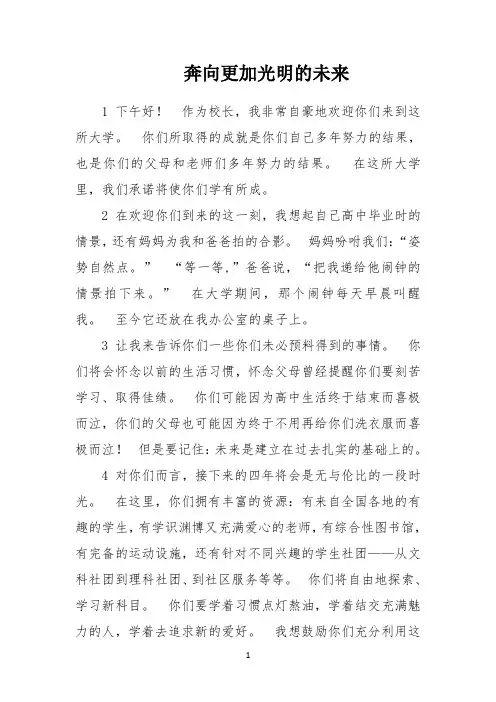
奔向更加光明的未来1 下午好!作为校长,我非常自豪地欢迎你们来到这所大学。
你们所取得的成就是你们自己多年努力的结果,也是你们的父母和老师们多年努力的结果。
在这所大学里,我们承诺将使你们学有所成。
2 在欢迎你们到来的这一刻,我想起自己高中毕业时的情景,还有妈妈为我和爸爸拍的合影。
妈妈吩咐我们:“姿势自然点。
”“等一等,”爸爸说,“把我递给他闹钟的情景拍下来。
”在大学期间,那个闹钟每天早晨叫醒我。
至今它还放在我办公室的桌子上。
3 让我来告诉你们一些你们未必预料得到的事情。
你们将会怀念以前的生活习惯,怀念父母曾经提醒你们要刻苦学习、取得佳绩。
你们可能因为高中生活终于结束而喜极而泣,你们的父母也可能因为终于不用再给你们洗衣服而喜极而泣!但是要记住:未来是建立在过去扎实的基础上的。
4 对你们而言,接下来的四年将会是无与伦比的一段时光。
在这里,你们拥有丰富的资源:有来自全国各地的有趣的学生,有学识渊博又充满爱心的老师,有综合性图书馆,有完备的运动设施,还有针对不同兴趣的学生社团——从文科社团到理科社团、到社区服务等等。
你们将自由地探索、学习新科目。
你们要学着习惯点灯熬油,学着结交充满魅力的人,学着去追求新的爱好。
我想鼓励你们充分利用这一特殊的经历,并用你们的干劲和热情去收获这一机会所带来的丰硕成果。
5 有这么多课程可供选择,你可能会不知所措。
你不可能选修所有的课程,但是要尽可能体验更多的课程!大学里有很多事情可做可学,每件事情都会为你提供不同视角来审视世界。
如果我只能给你们一条选课建议的话,那就是:挑战自己!不要认为你早就了解自己对什么样的领域最感兴趣。
选择一些你从未接触过的领域的课程。
这样,你不仅会变得更加博学,而且更有可能发现一个你未曾想到的、能成就你未来的爱好。
一个绝佳的例子就是时装设计师王薇薇,她最初学的是艺术史。
随着时间的推移,王薇薇把艺术史研究和对时装的热爱结合起来,并将其转化为对设计的热情,从而使她成为全球闻名的设计师。

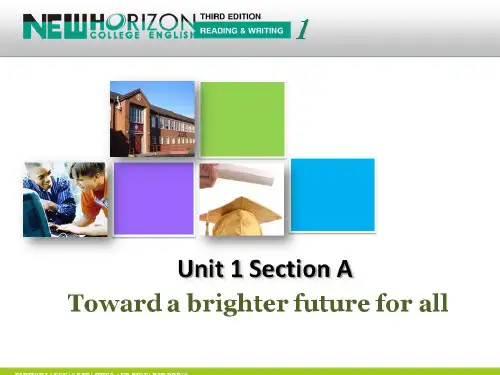
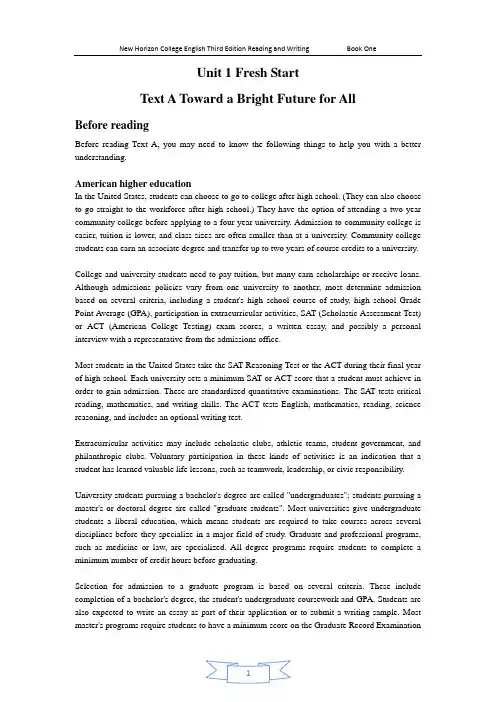
Unit 1 Fresh StartText A Toward a Bright Future for AllBefore readingBefore reading Text A, you may need to know the following things to help you with a better understanding.American higher educationIn the United States, students can choose to go to college after high school. (They can also choose to go straight to the workforce after high school.) They have the option of attending a two-year community college before applying to a four-year university. Admission to community college is easier, tuition is lower, and class sizes are often smaller than at a university. Community college students can earn an associate degree and transfer up to two years of course credits to a university.College and university students need to pay tuition, but many earn scholarships or receive loans. Although admissions policies vary from one university to another, most determine admission based on several criteria, including a student's high school course of study, high school Grade Point Average (GPA), participation in extracurricular activities, SAT (Scholastic Assessment Test) or ACT (American College Testing) exam scores, a written essay, and possibly a personal interview with a representative from the admissions office.Most students in the United States take the SAT Reasoning Test or the ACT during their final year of high school. Each university sets a minimum SAT or ACT score that a student must achieve in order to gain admission. These are standardized quantitative examinations. The SAT tests critical reading, mathematics, and writing skills. The ACT tests English, mathematics, reading, science reasoning, and includes an optional writing test.Extracurricular activities may include scholastic clubs, athletic teams, student government, and philanthropic clubs. V oluntary participation in these kinds of activities is an indication that a student has learned valuable life lessons, such as teamwork, leadership, or civic responsibility.University students pursuing a bachelor's degree are called "undergraduates"; students pursuing a master's or doctoral degree are called "graduate students". Most universities give undergraduate students a liberal education, which means students are required to take courses across several disciplines before they specialize in a major field of study. Graduate and professional programs, such as medicine or law, are specialized. All degree programs require students to complete a minimum number of credit hours before graduating.Selection for admission to a graduate program is based on several criteria. These include completion of a bachelor's degree, the student's undergraduate coursework and GPA. Students are also expected to write an essay as part of their application or to submit a writing sample. Most master's programs require students to have a minimum score on the Graduate Record Examination(GRE), which tests verbal reasoning, quantitative reasoning, critical thinking, and analytical writing skills.Students continue to take courses at the graduate level. A final thesis is required for most master's programs. Doctoral students take courses until they have earned enough credit hours to attempt their qualifying examinations. These are usually taken over several days and often include a written and oral component. After doctoral students pass their qualifying exams, they are advanced to candidacy and can begin writing their dissertation. Before the degree is given, the completed dissertation must be orally defended before the candidate's faculty committee.Vera WangVera Wang (王薇薇, 1949- ) is aChinese-American fashion designer. Shewas born and raised in New York City.While trained as a figure skater in highschool, she eventually earned a degree in arthistory from Sarah Lawrence College in1971. But a career in fashion was her dream.She worked as a senior fashion editorfor Vogue magazine for 15 years. In 1985,she left Vogue and joined Ralph Lauren as adesign director for two years. In 1990, she opened her own design salon in New York, and featured her trademark bridal gowns. Wang has made wedding gowns for many celebrities and public figures, such as Jennifer Lopez (珍妮弗•洛佩兹), Sharon Stone (莎朗•斯通) and Chelsea Clinton (切尔西•克林顿).Detailed study of the textPara.1. Good afternoon! As president of the university, I am proud to welcome you to this university. Your achievement is the triumph of years of hard work, both of your own and of your parents and teachers. Here at the university, we pledge to make your educational experience as rewarding as possible.下午好!作为校长,我非常自豪地欢迎你们来到这所大学。
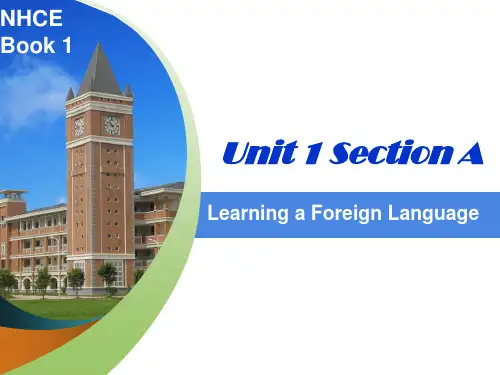
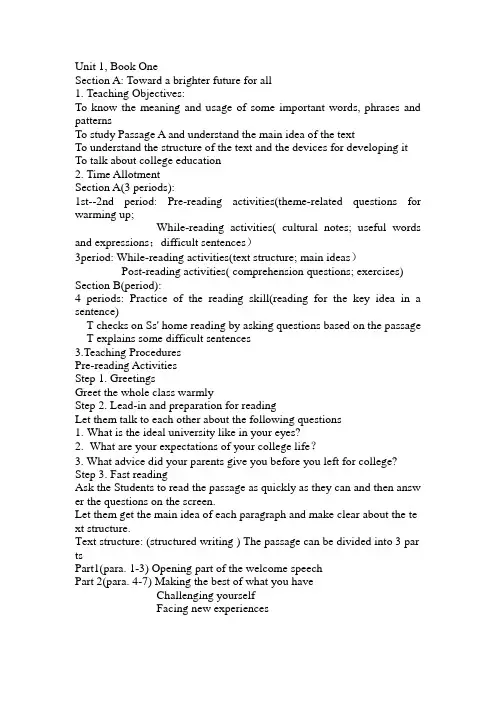
Unit 1, Book OneSection A: Toward a brighter future for all1. Teaching Objectives:To know the meaning and usage of some important words, phrases and patternsTo study Passage A and understand the main idea of the textTo understand the structure of the text and the devices for developing it To talk about college education2. Time AllotmentSection A(3 periods):1st--2nd period: Pre-reading activities(theme-related questions for warming up;While-reading activities( cultural notes; useful words and expressions;difficult sentences)3period: While-reading activities(text structure; main ideas)Post-reading activities( comprehension questions; exercises) Section B(period):4 periods: Practice of the reading skill(reading for the key idea in a sentence)T checks on Ss' home reading by asking questions based on the passage T explains some difficult sentences3.Teaching ProceduresPre-reading ActivitiesStep 1. GreetingsGreet the whole class warmlyStep 2. Lead-in and preparation for readingLet them talk to each other about the following questions1.What is the ideal university like in your eyes?2. What are your expectations of your college life?3. What advice did your parents give you before you left for college? Step 3. Fast readingAsk the Students to read the passage as quickly as they can and then answ er the questions on the screen.Let them get the main idea of each paragraph and make clear about the te xt structure.Text structure: (structured writing ) The passage can be divided into 3 par tsPart1(para. 1-3) Opening part of the welcome speechPart 2(para. 4-7) Making the best of what you haveChallenging yourselfFacing new experiencesOpportunities and responsibilitiesPart 3 (Para. 8)Concluding remarks of the welcome speechPurpose: Improve the students'reading and writing ability and understand the general ideaof each paragraph.Method: Read the text individually and talk in groups; Use task-based lan guage teachingmethod, reading approach, communicative approach and total physical re sponse method.Step 4. Preparation for details of the text on the screenStudents are required to look at the Words and Phrases on the screen and give a briefpresentation In Class.Words and Phrases:Purpose: Train the Students'ability of understanding and using foreign languageMethod: Talk in groups, Use task-based language teaching method, com municativeapproach and total physical response method.1.(Para.1) pledge to do sth.作保证,承诺China and the United states pledge to boost cooperation and exchange to ensure a betterfuture for China-us ties中美政府承诺将加强合作与交流以确保两国关系的未来更加美好2.(Para. 2)remind sb of sb./sth1) make sb. remember sb. that they know or sth. that happened in t he past.使某人想起某人某事The song always reminds me of our holiday in Mexico.那首歌总让我想起我们在琴西哥的那次假期。
Unit 1 Fresh StartText A Toward a Bright Future for AllBefore readingBefore reading Text A, you may need to know the following things to help you with a better understanding.American higher educationIn the United States, students can choose to go to college after high school. (They can also choose to go straight to the workforce after high school.) They have the option of attending a two-year community college before applying to a four-year university. Admission to community college is easier, tuition is lower, and class sizes are often smaller than at a university. Community college students can earn an associate degree and transfer up to two years of course credits to a university.College and university students need to pay tuition, but many earn scholarships or receive loans. Although admissions policies vary from one university to another, most determine admission based on several criteria, including a student's high school course of study, high school Grade Point Average (GPA), participation in extracurricular activities, SAT (Scholastic Assessment Test) or ACT (American College Testing) exam scores, a written essay, and possibly a personal interview with a representative from the admissions office.Most students in the United States take the SAT Reasoning Test or the ACT during their final year of high school. Each university sets a minimum SAT or ACT score that a student must achieve in order to gain admission. These are standardized quantitative examinations. The SAT tests critical reading, mathematics, and writing skills. The ACT tests English, mathematics, reading, science reasoning, and includes an optional writing test.Extracurricular activities may include scholastic clubs, athletic teams, student government, and philanthropic clubs. V oluntary participation in these kinds of activities is an indication that a student has learned valuable life lessons, such as teamwork, leadership, or civic responsibility.University students pursuing a bachelor's degree are called "undergraduates"; students pursuing a master's or doctoral degree are called "graduate students". Most universities give undergraduate students a liberal education, which means students are required to take courses across several disciplines before they specialize in a major field of study. Graduate and professional programs, such as medicine or law, are specialized. All degree programs require students to complete a minimum number of credit hours before graduating.Selection for admission to a graduate program is based on several criteria. These include completion of a bachelor's degree, the student's undergraduate coursework and GPA. Students are also expected to write an essay as part of their application or to submit a writing sample. Most master's programs require students to have a minimum score on the Graduate Record Examination(GRE), which tests verbal reasoning, quantitative reasoning, critical thinking, and analytical writing skills.Students continue to take courses at the graduate level. A final thesis is required for most master's programs. Doctoral students take courses until they have earned enough credit hours to attempt their qualifying examinations. These are usually taken over several days and often include a written and oral component. After doctoral students pass their qualifying exams, they are advanced to candidacy and can begin writing their dissertation. Before the degree is given, the completed dissertation must be orally defended before the candidate's faculty committee.Vera WangVera Wang (王薇薇, 1949- ) is aChinese-American fashion designer. Shewas born and raised in New York City.While trained as a figure skater in highschool, she eventually earned a degree in arthistory from Sarah Lawrence College in1971. But a career in fashion was her dream.She worked as a senior fashion editorfor Vogue magazine for 15 years. In 1985,she left Vogue and joined Ralph Lauren as adesign director for two years. In 1990, she opened her own design salon in New York, and featured her trademark bridal gowns. Wang has made wedding gowns for many celebrities and public figures, such as Jennifer Lopez (珍妮弗•洛佩兹), Sharon Stone (莎朗•斯通) and Chelsea Clinton (切尔西•克林顿).Detailed study of the textPara.1. Good afternoon! As president of the university, I am proud to welcome you to this university. Your achievement is the triumph of years of hard work, both of your own and of your parents and teachers. Here at the university, we pledge to make your educational experience as rewarding as possible.下午好!作为校长,我非常自豪地欢迎你们来到这所大学。
Unit 1Fresh StartUnderstanding and LearningOverviewThe first unit of the first book of our series meets students who have just entered college or university and are beginning a new phase in their lives. We hope that students will be able to talk about their expectations of their college experience, and they will be aware of the expectations their parents and their educators have of them.Text A is a university president’s welcome speech, in which the president gives valuable guidance to and expresses expectations of freshman students.Text B is a letter written by a father to his child who is about to start college, in which the father expresses his expectations of the child. We hope that the two texts will stimulate students to share their own expectations regarding their college experience; and we also hope the two texts will help students look from a new perspective at the expectations their educators and their parents have of themText A shows characteristics of a speech. Pronouns I, we and you are more frequently used than in other kinds of writing because the speaker is addressing the audience directly, hoping to motivate the audience and to gain their support and understanding. In a speech, the speaker can employ a variety of figures of speech to make his speech vivid and powerful, such as simile, metaphor, contrast, parallelism(排比), and repetition. A very common figure of speech is parallelism. In parallelism, coordinate ideas are arranged in words, phrases, sentences, and paragraphs to emphasize and point out relations. In Text A, for example, the president uses many sentences of parallel structure. This makes his speech powerful, persuasive, and thought-provoking. It can even produce humorous effect as in the example: “You may have cried tears of joy to be finally finished with high school, and your parents may have cried tears of joy to be finally with doing your laundry!”The most obvious feature of Text B is that it contains many imperative sentences, and these sentences tend to be brief. An imperative sentence advises, instructs, requests, or commands. It begins with a verb; the implied subject is you.In Text B, a father makes use of imperative sentences to give advice and instructions to his child who has just left home for college. For example: “Don’t be bound by what other people think.”“Pick friends who are genuine and sincere.”“Become the great thinker you were born to be.”In class the teacher can make the students compare the writing styles of Text A and Text B. Class activities may include pair work, group discussions, and mini-surveys about students’high school experience, their families and friends, and their expectations of college life.Section AToward a brighter future for allBackground information1. American higher educationIn the United States, students can choose to go to college after high school. (They can also choose to go straight to the workforce after high school.) They have the option of attending a two-year community college before applying to a four-year university. Admission to communitycollege is easier, tuition is lower, and class sizes are often smaller than at a university. Community college students can earn an associate agree and transfer up to two years of course credits to a university.College and university students need to pay tuition, but many earn scholarships or receive loans. Although admissions policies vary from one university to another, most determine admission based on several criteria, including a student’s high school course of study, high school Grade Point Average (GPA), participation in extracurricular activities, SAT(Scholastic Assessment Test) or ACT (American College Testing) exam scores, a written essay, and possibly a personal interview with a representative from the admissions office.Most students in the United States take the SAT Reasoning Test or the ACT during their final year of high school. Each university sets a minimum SAT or ACT score that a student must achieve in order to gain admission. These are standardized quantitative examinations. The SAT tests critical reading, mathematics, and writing skills, The ACT tests English, mathematics, reading, science reasoning, and includes an optional writing test.Extracurricular activities may include scholastic clubs, athletic teams, student government, and philanthropic clubs. V oluntary participation in these kinds of activities is an indication that a student has learned valuable life lessons, such as teamwork, leadership, or civic responsibility.University students pursuing a bachelor’s degree are called “undergraduates”; students pursuing a master’s or doctoral degree are called “graduate students”. Most universities give under graduate students a liberal education, which means students are required to take courses across several disciplines before they specialize in a major field of study. Graduate and professional programs, such as medicine or law, are specialized. All degree programs require students to complete a minimum number of credit hours before graduating.Selection for admission to a graduate program is based on several criteria. These include completion of a bachelor’s degree, the student’s undergraduate coursework and GPA. Students are also expected to write an essay as part of their application or to submit a writing sample. Most master’s programs require students to have a minimum score on the Graduate Record Examination (GRE), which tests verbal reasoning, quantitative reasoning, critical thinking, and analytical writing skills.Students continue to take course at the graduate level. A final thesis is required for most master’s programs. Doctoral students take course until they have earned enough credit hours to attempt their qualifying examinations. These are usually taken over several days and often include a written and oral component. After doctoral students pass their qualifying exams, they are advanced to candidacy and can begin writing their dissertation. Before the degree is given, the completed dissertation must be orally defended before the candidate’s faculty committee.2. Vera WangVera Wang is a Chinese-American fashion designer. She was born and raised in New York City. While trained as a figure skater in high school, she eventually earned a degree in art history from Sarah Lawrence College in 1971. But a career in fashion was her dream. She worked as a senior fashion editor for Vogue magazine for 15 years. In 1985, she left vogue and joined Ralph Lauren as a design director for two years. In 1990, she opened her own design salon in New York, and featured her trademark bridal gowns. Wang has made wedding gowns for many celebrities and public figures, such as Jennifer Lopez (詹尼佛·洛佩兹), Sharon Stone (莎朗·斯通) and Chelsea Clinton (切尔西·克林顿).。
新视野大学英语1读写教程《新视野大学英语1》读写教程Unit 1 绿色生活In recent years, people have become increasingly concerned about the environment. As a result, many individuals and communities have embraced the idea of leading a "green" lifestyle. This means being mindful of our daily choices and actions, and making efforts to reduce our negative impact on the planet.There are several ways that we can incorporate green habits into our lives. One of the most important steps is to reduce, reuse, and recycle. By reducing the amount of waste we produce, reusing items whenever possible, and recycling materials, we can greatly reduce the strain on our natural resources. Additionally, choosing energy-efficient appliances and using renewable sources of energy, such as solar power, can also contribute to a greener lifestyle.Another aspect of green living is being mindful of our consumption habits. This means considering the environmental impact of the products we buy and the food we eat. Choosing organic produce and locally-sourced products can help reduce the carbon footprint associated with transportation and the use of pesticides. Cutting down on meat consumption is another way to reduce our environmental impact, as the meat industry is one of the leading contributors to greenhouse gas emissions.In conclusion, living a green lifestyle is all about making consciouschoices that prioritize the well-being of the planet. By adopting habits such as reducing waste, using renewable energy, and being mindful of our consumption, we can all play a part in creating a more sustainable future.Unit 2 音乐的力量Music has a unique power to evoke emotions and bring people together. It is an art form that transcends cultural and linguistic barriers, allowing individuals from different backgrounds to connect and communicate.One of the most powerful aspects of music is its ability to express and evoke emotions. Whether it is the joyous melodies of a symphony or the melancholic notes of a blues song, music has the power to stir deep feelings within us. It can provide solace and comfort during difficult times, or lift our spirits and energize us when we need a boost.Furthermore, music has the power to bring people together. It serves as a universal language that can unite individuals regardless of their native tongue. In concerts and music festivals, people from all walks of life gather to celebrate the magic of music. Even in everyday life, sharing a favorite song or singing together with friends can create a sense of camaraderie and foster a sense of belonging.In conclusion, music is a powerful force that has the ability to touch our hearts and connect us with others. Its ability to evokeemotions and bring people together makes it a universal language that transcends cultural boundaries.。
Unit 1
Section A
Learning a Foreign Language
Learning a foreign language was one of the most difficult yet most rewarding experiences of my life. Although at times, learning a language was frustrating, it was well worth the effort.
My experience with a foreign language began in junior middle school, when I took my first English class. I had a kind and patient teacher who often praised all of the students. Because of this positive method, I eagerly answered all the questions I could, never worrying much about making mistakes. I was at the top of my class for two years.
When I went to senior middle school, I was eager to continue studying English; however, my experience in senior school was very different from before. While my former teacher had been patient with all the students, my new teacher quickly punished those who gave incorrect answers. Whenever we answered incorrectly, she pointed a long stick at us and, shaking it up and down, shouted, "No! No! No!" It didn't take me long to lose my eagerness to answer questions. Not only did I lose my joy in answering questions, but also I totally lost my desire to say anything at all in English.
However, that state didn't last long. When I went to college, I learned that all students were required to take an English course. Unlike my senior middle school teacher, my college English teachers were patient and kind, and none of them carried long, pointed sticks! However, the situation was far from perfect. As our classes were very large, I was only able to answer a couple of questions in each class period. Also, after a few weeks of classes, I noticed there were many students who spoke much better than I did. I began to feel intimidated. So, once again, although for different reasons, I was afraid to speak. It seemed my English was going to stay at the same level forever.
That was the situation until a couple of years later, when I was offered an opportunity to study English through an online course. The communication medium was a computer, phone line, and modem. I soon got access to the necessary equipment, learned the technology from a friend and participated in the virtual classroom 5 to 7 days a week.
Online learning is not easier than regular classroom study; it requires much time, commitment and discipline to keep up with the flow of the course. I worked hard to meet the minimum standards set by the course and to complete assignments on time.
I practiced all the time. I carried a little dictionary with me everywhere I went, as well as a notebook in which I listed any new words I heard. I made many, sometimes embarrassing, mistakes. Once in a while I cried with frustration, and sometimes I felt like giving up. But I didn't feel intimidated by students who spoke faster than I did because I took all the time I needed to think out my ideas and wrote a reply before posting it on the screen. Then, one day I realized I could understand just about everything I came across, and most importantly, I could "say" anything I wanted to in English. Although I still made many mistakes and was continually learning, I had finally reaped the benefits of all that hard work.
Learning a foreign language has been a most trying experience for me, but one that I wouldn't trade for anything. Not only did learning another language teach me the value of hard work, but it
also gave me insights into another culture, and my mind was opened to new ways of seeing things. The most wonderful result of having learned a foreign language was that I could communicate with many more people than before. Talking with people is one of my favorite activities, so being able to speak a new language lets me meet new people, participate in conversations, and form new, unforgettable friendships. Now that I speak a foreign language, instead of staring into space when English is being spoken, I can participate and make friends. I am able to reach out to others and bridge the gap between my language and culture and theirs.
Words: 700。